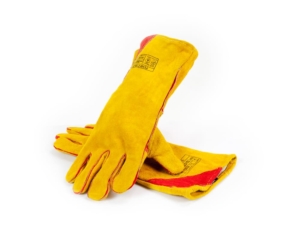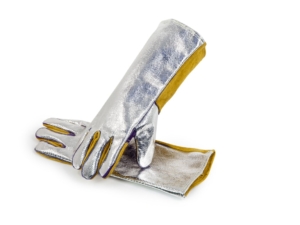Welding Gloves: A Provincial Safety Guide
When it comes to PPE, welding gloves might just be one of the most important yet most easily overlooked pieces of equipment. Read on to find out why they are so crucial when you are working with hot materials.
Key Points
Welding Gloves Definition: What Are Welding Gloves?
Welding gloves are a form of PPE designed to shield the hands of workers from injury while they are engaged in potentially dangerous activities. These gloves provide abrasion resistance, improved grip, and protection from electrical shock, high heat, UV and infrared radiation, all while allowing the user full range of motion of their fingers.
Welding gloves are an essential part of any welding outfit (which includes a helmet, coveralls, etc.), but they require extra attention to detail because of their close proximity to the heat source. One can wear gloves that cover the entire hand and have separate compartments for each finger and thumb. Welding mittens are currently available, but it should be emphasised that they are generally less useful. Regardless, the underlying idea is the same: the fabrics used in these garments are robust, non-conductive to electricity, and good at dispersing body heat. Oversized cuffs on many gloves act like vambraces, shielding the wearer's forearms from splashes.
Safety welding gloves are often made from split or top leather, which is obtained from the skin of various livestock. Cow, deer, elk, goat, and swine hides all provide varying degrees of comfort.
Why Are Welding Gloves Important?
The main reason to wear welding gloves is safety. Welding is a dangerous task, and it can cause injury in a number of different ways, including burning and cuts and scratches.
However, another issue is UV light. UV light with a high intensity is produced during welding. Your face and eyes are safe behind the visor, but what about your hands? When you wear welding gloves, your hands are protected from the additional risk of burning that UV light brings. Industrial welding gloves also protect against electric shocks, and they will prevent cuts, fractures, punctures, and sprains to the hands.
Plus, of course, wearing welding gloves means you are paying attention to the health and safety protocols of the site you're working on.
Benefits Of Using Welding Gloves
The use of the best welding gloves is often overlooked when considering protective clothing for the workplace, yet it is essential. It would cost six times as much to compensate for damage to workers' hands than it would to equip a construction workforce. In other words, wearing welding gloves can save you and your business money. There are other benefits too.
Reduced Risk of Burns
Keep in mind that the sparks created by stick and MIG welding can reach temperatures of up to 600 degrees Fahrenheit (315 degrees Celsius). Welding gloves will keep your arms and hands safe from sparks.
That same resistance to heat can keep you safe if you accidentally pick up or put your hand on a hot metal object. Extra lining is included in the construction of many heavier gloves to improve this quality. Welded metal radiates infrared heat, which can also cause serious injury to bare flesh.
Prevention Of Cuts and Scratches
Injuries like cuts and lacerations are common in industrial settings, and welding is no different. In fact, welding might even cause more cuts and scratches than other tasks because you could cut yourself on the jagged or sharp edges of the components. With a Kevlar lining, gloves can protect against cuts without becoming uncomfortable and without reducing the hand’s mobility.
Looking For the Right Welding Gloves for Your Workforce? Speak To the Experts Today
Find the right type of welding gloves to keep your workforce protected by checking out our full welding gloves range here, or by speaking to a member of the experienced Provincial Safety team today on +44(0)121 544 5208 or by emailing sales@provincialsafety.co.uk.



